- Discussions/
- #29/
Mimir 2.0 - multisig optimize and proxy pallet support
Content
AI Summary
Proponent: DtrLdpbF7dP5bdcDhqMMtSFqywFKRjtuY9WHyx4JqYzaMgS
Date: 2024/07/29-2024/10/30
Proposal Payment: 7,253 KSM($166,120)
Short description: Mimir goes further by providing multisig users with features such as 1/N multisig, batch transactions, and staking. Additionally, it introduces a new account structure—Proxy accounts—filling the gap in the ecosystem for related applications.
Project Category: Infrastructure/Dapp
Website: https://app.mimir.global/
Full Proposal: Treasury Proposal: Mimir 2.0 - Multisig Optimize And Proxy
This is a follow up proposal to what we submitted before.
https://polkadot.polkassembly.io/referenda/462
Concept
Multisig ->https://wiki.polkadot.network/docs/learn-guides-accounts-multisig
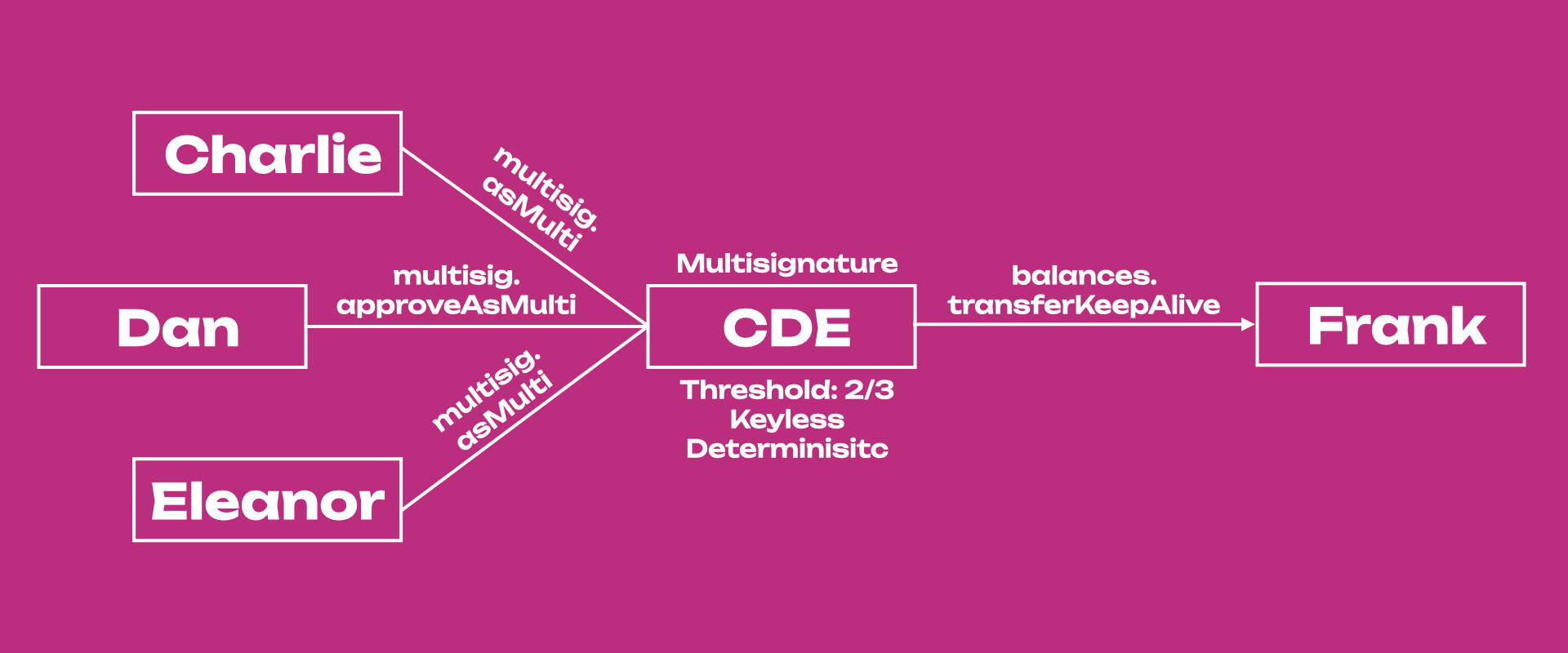
Proxy ->https://wiki.polkadot.network/docs/learn-guides-accounts-proxy
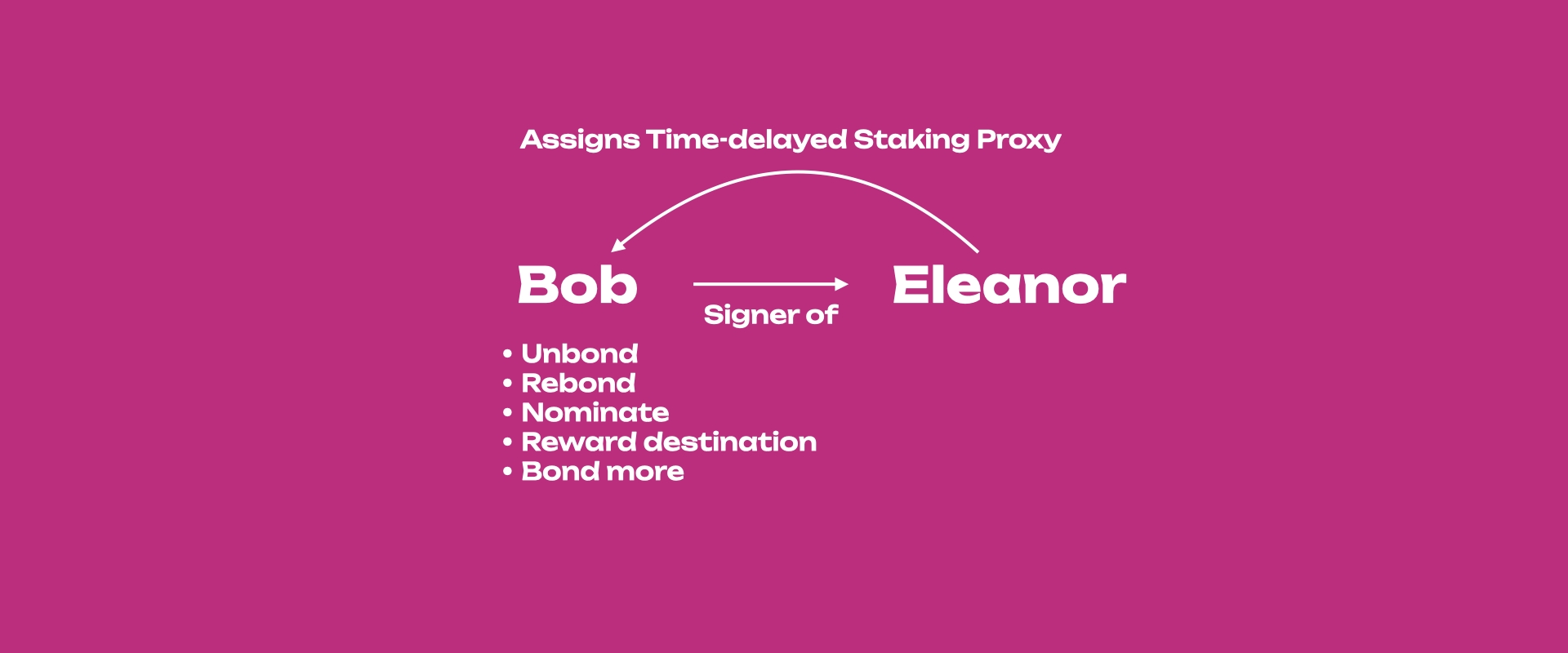
Review
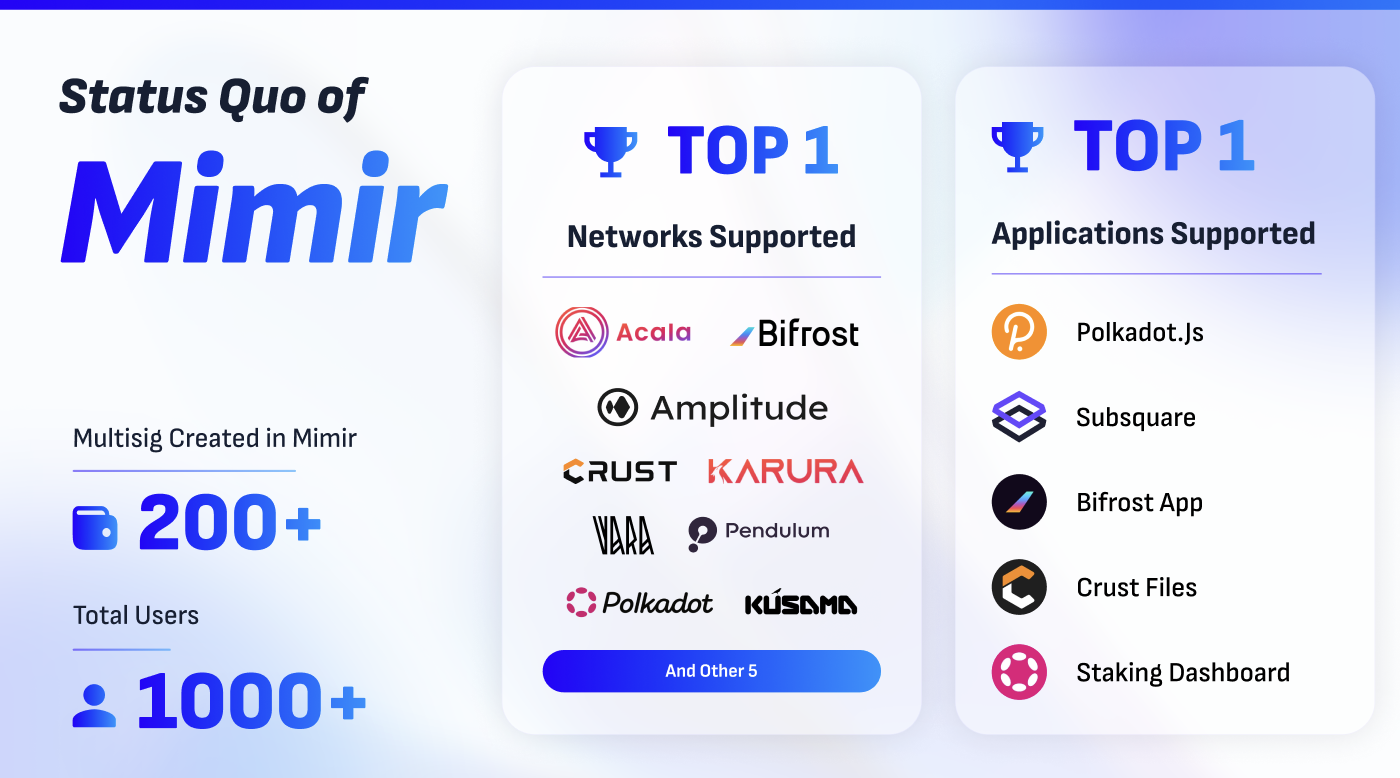
Features
The Mimir team has successfully adapted the multisig functionality for the Polkadot ecosystem in the first phase of development. We have accomplished the following:
- Creation of unlimited levels of nested multisig
- Synchronization and management of transactions within nested multisig at any level
- Onboarding of multisig users through third-party applications using the Mimir SDK
These features make Mimir a powerful multisig tool capable of meeting various complex needs. Whether the users are individual or institutional investors, regardless of the scale of fund management, Mimir can accommodate the vast majority of their multisig usage requirements.
Users
In this process, Mimir has created approximately 200 new multisig accounts and served over 1,000 addresses. Based on user feedback, some public chain projects are already using the Mimir wallet for account asset management. Additionally, some multisig-based DAOs are using the Mimir wallet for governance-related activities.
Trusted Partner: Polkadot Mexcian, Mosiac
Network
We have successfully integrated with dozens of networks, covering most of the major networks within the Polkadot ecosystem:
Polkadot & Parachain: Assethub, Bifrost, Crust, Pendulum, Acala
Kusama & Parachain: Kusama, Bifrost Kusama, Amplitude, Karura
Solo Chain: Vara, Crust
Testnet: Rococo, Paseo
Mimir is the multisig wallet with the most network integrations within the Dotsama ecosystem.
Application
We have also completed the integration of several applications, including:
- Subsquare
- Bifrost App
- Crust Files
- Polkadot JS
- Polkadot Staking Dashboard
Mimir is the multisig wallet with the most application integrations within the Dotsama ecosystem.
Social
On social media, our Twitter account has grown from zero to over 2,000 followers.
We have organized a total of 8 events in collaboration with networks, communities, and applications, with approximately 200 participants involved in these events.
Background
Multisig Optimize
1. No application supports the creation of 1/N multisig
Data
In the Ethereum ecosystem, 1/1 multisig accounts are currently the most common, making up 47% of all multisig accounts. Additionally, all 1/N multisig collectively constitute 62% of the total number of multisig wallets.
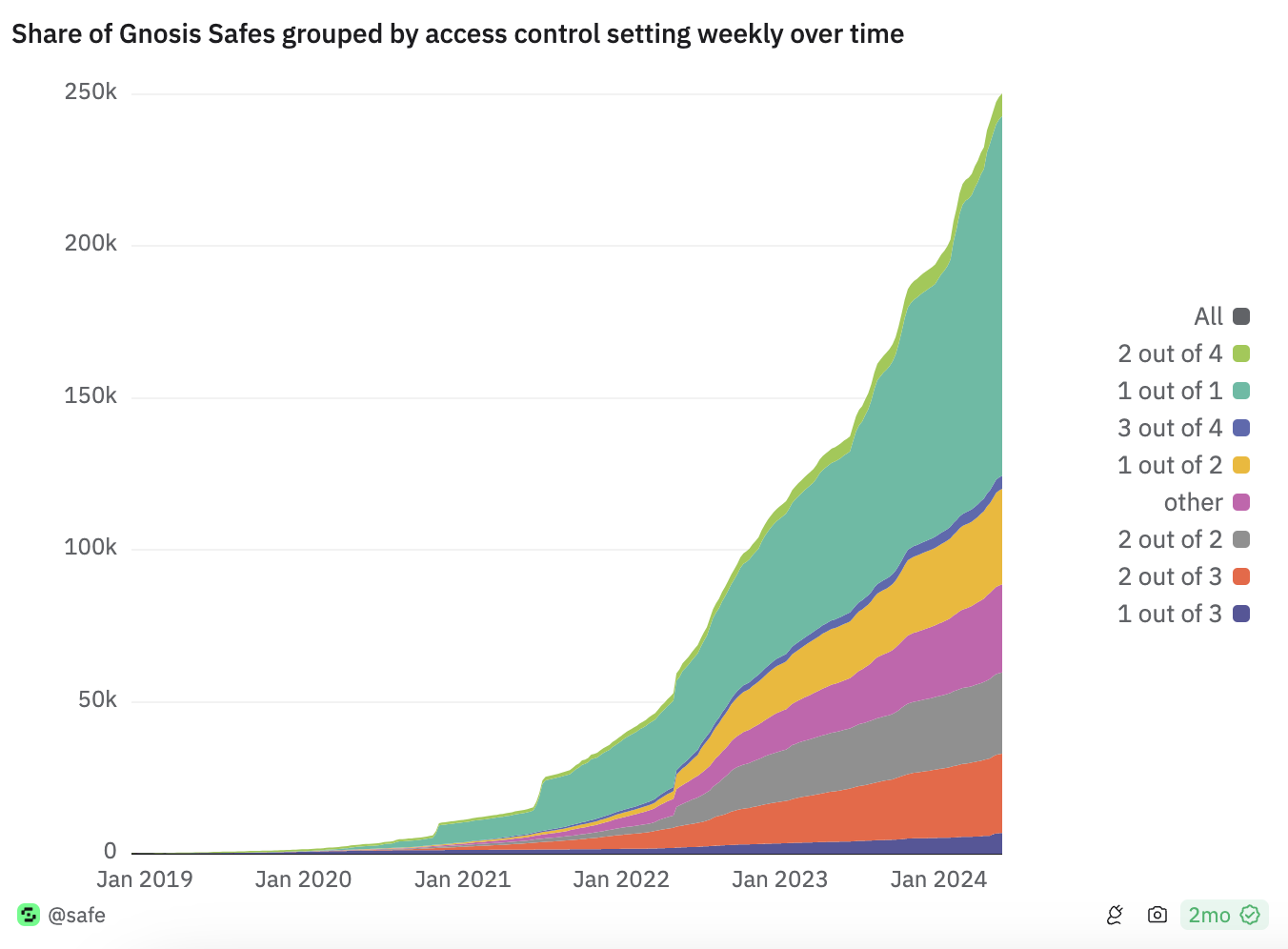
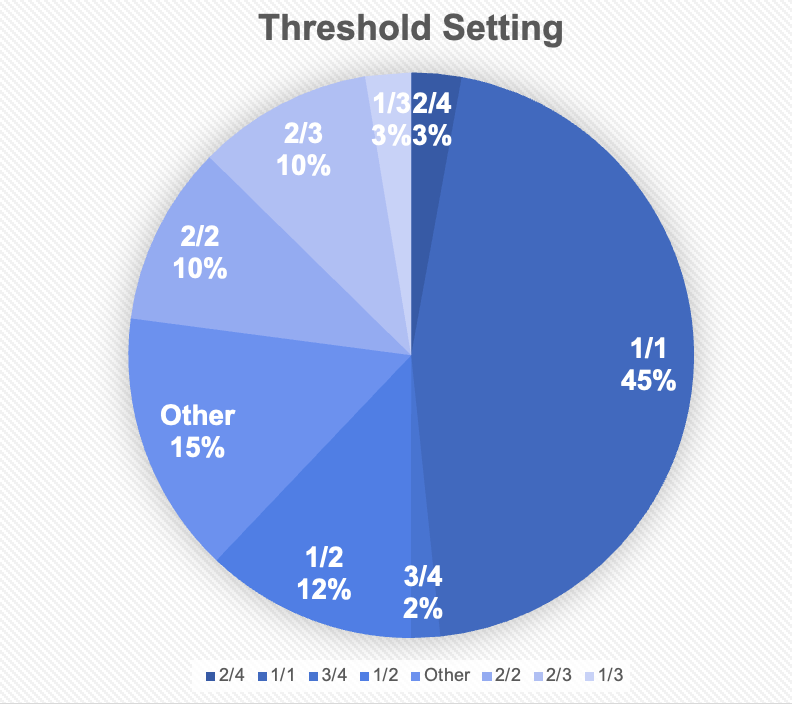
Problem
Based on the distribution in the Ethereum ecosystem, if we support 1/N multisig and implement other possible optimizations (such as adjusting deposit fees), the number of multisig accounts in Polkadot could potentially double.
However, in the current Polkadot ecosystem, while Substrate's Multisig Pallet natively supports 1/N multisig, there are no existing multisig products that offer this feature.

This limitation restricts the usage scenarios for multisig users, significantly raising the usage threshold for individual users. This is not conducive to the development of the ecosystem.
2. The compatibility of multisig products for high-frequency extrinsic is low
Data
Batch and staking are the transaction types we have identified as the most common after transfers. However, in the Polkadot ecosystem, no products other than Polkadot.js have been developed to handle these types of transactions effectively.
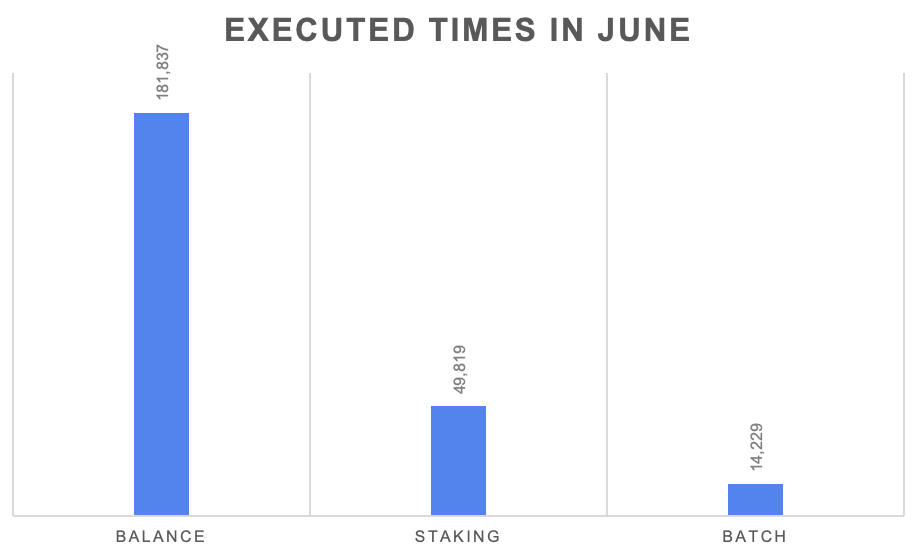
Problem
Currently, none of the various multisig or extension products in the Polkadot ecosystem offer a similar application that can visually cache the transactions users wish to execute. When users need to perform a transaction, they can select the relevant transactions from the cache page and initiate them in a bundled manner.
The staking module is a common operation, and while Polkadot has developed a Staking Dashboard App for this purpose, it still does not support multisig accounts.
This means that when users need to send assets in bulk or perform advanced DeFi operations, they lack effective tools. This limitation inevitably restricts the development of ecosystem applications. Many DeFi functions that are achieved through composability in other ecosystems have very high operational thresholds in the Polkadot ecosystem. This also restricts the design of applications on the product side, preventing the full release of the ecosystem's potential.
3. No multisig solution provides cross-chain check capabilities
Data
From June 1 to July 1, there were a total of 862,597 cross-chain XCM transactions within the Polkadot ecosystem. With the opening of the Kusama and Polkadot <> Ethereum bridges, cross-chain interactions will see even more practical use cases.
Problem
Polkadot emphasizes cross-chain information interaction, but cross-chain operations still involve significant uncertainty and risk for users.
When users perform cross-chain operations, they typically need to select an address on the original chain and an address on the target chain. If they choose a non-existent address on the target chain, it will inevitably lead to asset loss. This is particularly problematic for Pure Proxy accounts, which only exist on one chain. Without proper security prompts, cross-chain operations can easily result in asset loss.
Implementing such safety checks independently within each app that executes cross-chain transactions can be complex. Therefore, Mimir can intercept and prevent such risky actions when users submit transactions, ensuring these issues are avoided.
Proxy
1. No application supports operations for proxy accounts
Data
In the Polkadot and Kusama networks, 1,594 accounts have delegated some of their permissions to other accounts. The number of multisig accounts in the Polkadot network is 1,148, while in the Kusama network, the need for user-friendly proxy account operations is even greater, given that there are only 417 multisig accounts.
Introduction
When users want to enhance their account security level or operational convenience, Proxy Accounts become their best choice.
Ordinary Proxy: Proxy establishes a relationship between two accounts. The Proxied Account delegates some of its authority to the Proxy Account, allowing it to perform certain operations on its behalf. The delegated authority can include Any, Non-Transfer, Governance, Staking, Auction, etc.
Pure Proxy: Unlike Proxy, which establishes a relationship between two existing accounts, Pure Proxy is a process of creating a new account. Once executed, it creates a new Proxied Account that is not controlled by any private key and can only be controlled by the Proxy Account.
Problem
In the current ecosystem, Proxy is a more common security account management solution than multisig. However, there are no user-friendly tools for managing Proxy accounts.
Currently, only Polkadot.js allows for the delegation and authorization of Proxy accounts, which is not user-friendly for newcomers. Especially, the combination of Proxy and multisig accounts can meet most fund management needs. For example, managing funds with multisig and delegating the Non-Transfer permissions of the multisig account to a extension account for daily staking maintenance and governance participation.
To attract more users, a more productized solution is needed.
2. No application supports the delayed proxy feature
Introduction
Smart Account is a crucial concept in the Ethereum ecosystem, enabling accounts to have richer functionalities, such as delegation and small-amount payments without verification. This gives Safe a significant advantage over other multisig accounts.
In the Polkadot ecosystem, Substrate natively supports Delayed Proxy. This feature allows a Proxy Account to propose a transaction that goes through a Review Window. During this period, the Proxied Account can cast a veto vote against the proposal. If the Proxied Account completes the veto vote, the transaction is canceled. If there is no veto, the transaction executes after the Review Window ends. This feature enables several functionalities:
Account Recovery: The Proxied Account is a multisig account, and the Proxy Account is a trusted third party. If a member of the multisig loses their private key, the trusted third party can reset the members.
Optimistic Governance: The Proxied Account is a multisig account, and the Proxy Account is an active governance participant. When new proposals arise, the Proxy Account can present its opinions. If there are not enough vetoes, the proposal executes according to the governance participant's suggestion.
Problem
The delay functionality is indeed powerful, but its practical impact in the current ecosystem is quite limited. The reason lies in the lack of productized solutions.
This solution requires not only setting up the delay but also managing the full lifecycle of these transactions, as well as matching the interaction pages to the corresponding roles, such as distinguishing the usage strategies of Proxy Account and Proxied Account.
However, currently, no product can achieve this.
Watch-Only Mode
1. No application supports the Watch-Only feature for multisig accounts
Introduction
In the Ethereum ecosystem, Safe allows users to access any Safe-based multisig account to view its asset status, historical transactions, current transaction records, and module configurations.
Thanks to the public and transparent nature of blockchain technology, users are highly motivated to monitor large accounts, track project asset activities, and ensure these projects are adequately supervised.
Problem
The complexity of obtaining asset and member information for multisig accounts is significantly higher than for extension accounts. Currently, there is no application in the ecosystem dedicated to tracking multisig accounts.
Large projects typically manage their funds through multisig accounts. Without effective asset tracking tools, the transparency of the ecosystem is compromised, leading to reduced decentralization.
Ecosystem Fit
Mimir's product design philosophy is to enhance user experience by providing more user-friendly products rather than creating more underlying technology. In the Polkadot ecosystem, the underlying technology is very powerful; Substrate's Pallet can achieve almost any function. However, presenting these capabilities to users is something Parity hopes to encourage community developers to accomplish through treasury funding.
From Multisig to Proxy and Batch, Mimir has always been dedicated to presenting these features in a more user-friendly way. We use data analysis to understand users' real needs, optimizing and iterating on our products to contribute to the prosperity of the Polkadot ecosystem.
A more diverse account structure can attract a wider range of users.
Substrate's account system is richly designed to meet the diverse needs of various blockchain participants.
Normal Multisig: Ideal for whales, project teams, DAOs, and traditional institutions, it enables secure fund management.
1/N Multisig: Allows regular users to separate asset accounts from operation accounts at a lower cost and with simpler operations.
Proxy Accounts: Can be combined with normal multisig to delegate powers such as staking and governance to specialized operators, improving fund handling efficiency.
Pure Proxy: Offers enhanced privacy and censorship resistance.
ChaosDAO:
ChaosDAO's governance integrates multisig and Pure Proxy. Member votes are collected off-chain and then voted on-chain. An emergency committee proxy can modify votes in special circumstances.
Project Teams:
Project teams typically use multisig for overall fund management and delegate staking powers to dedicated finance personnel. This significantly enhances efficiency when maximizing asset returns.
As the ecosystem evolves and with the advent of Polkadot 2.0 and a potential cryptocurrency bull market, Polkadot's market value is expected to grow. The increasing demand for fund management within the Polkadot ecosystem requires effective multisig and proxy solutions. Without these, the entry barrier will rise significantly, hindering ecosystem development.
Mimir aims to simplify the creation of complex account models that meet diverse needs. By providing productized solutions, Mimir enables users to build sophisticated account structures tailored to various scenarios with ease.
More convenient transaction features can provide users with a better experience
In the Ethereum ecosystem, various tools assist with complex account transactions. Safe supports a range of sophisticated transaction tools, such as adding transactions to a batch and using a Transaction Builder. Additionally, Safe's Smart Account modules provide multisig accounts with greater flexibility and extensibility.
In the Polkadot ecosystem, Substrate also natively supports many of Safe's flexible transaction features. For example, the Utility module includes batch-related functions, and the Proxy Delay feature can implement capabilities like Recovery and Spend Limits.
Transaction Cache
Assembling a single transaction or multiple transactions can be time-consuming and labor-intensive, especially for recurring tasks. Mimir's Transaction Cache feature helps users store pending transactions for batch management. Combined with the Watch-Only feature, users can observe operations on other accounts and replicate transactions based on Transaction Hash, enabling them to follow KOLs and influencers' actions to improve their own returns.
Optimistic Proposals
Using Delayed Proxy, governance organizations can benefit from optimistic proposals. A member with a deep understanding of governance can prioritize voting according to their preferences. Other members can object during the Review Window. If there are insufficient objections, the proposal is executed according to the member's opinion, improving governance efficiency and shortening processes.
Convenient transaction features can significantly enhance the user experience within the Polkadot ecosystem, increasing the variety and richness of transactions and bringing more surprises to the community.
Milestones
Objectives
The focus of this version update revolves around the following aspects:
1. Multisig Optimization
- Adaptation for 1/N multisig
- Creation of 1/N multisig
- Automatic filling of zero address
- Modification of members for 1/N multisig
- Processing transactions for 1/N multisig
- Transaction Cache Feature
- Transaction Cache sidebar
- Transaction save entry
- Transaction copy functionality
- Importing transactions via hash/browser link
- Staking Dashboard Adaptation
- Local deployment of the Staking Dashboard
- Support for Mimir SDK adaptation
- Multisig/Proxy Cross-Chain Transfer Monitoring
- Safety Check Module
- Transaction Block
2. Proxy Account Adaptation
- Normal Proxy Accounts
- Proxy relationship binding process
- Proxied account usage process
- Mimir SDK compatibility
- Proxy account permissions check
- Integration of proxy and multisig relationships for unified display
- Pure Proxy Accounts
- Creation process for Pure Proxy accounts
- Adaptation of management processes for Pure Proxy accounts
- Distinction between Pure Proxy accounts and Flexible Multisig accounts
3. Watch-Only Accounts
- Address/public chain-based routing configuration
- Interaction for adding Watch-Only accounts
- Watch-Only permission rules
- Synchronization of Watch-Only accounts with local accounts
Budget
Working Hour and Fee
Edited
Mimir 2.0 - Multisig and Proxy Optimization
Project Overview: Mimir 2.0 aims to enhance multisig and proxy account features in the Polkadot ecosystem, making them more user-friendly and versatile.
Key Features:
- 1/N Multisig: Allows users to create multisig accounts with a single signer, improving accessibility.
- Proxy Accounts: Introduces a new account structure called Proxy accounts, which can delegate permissions for enhanced security and convenience.
- Batch Transactions: Enables users to bundle multiple transactions together, simplifying complex operations.
- Cross-Chain Monitoring: Provides safety checks to prevent asset loss during cross-chain transactions.
User Benefits:
- Simplified Account Management: Makes it easier for both individual and institutional users to manage their assets securely.
- Enhanced Security: Offers advanced security features like delayed proxy and watch-only modes.
- Better User Experience: Improves the overall user experience with features like transaction caching and optimistic proposals.
Integration:
- Network Compatibility: Mimir supports integration with dozens of networks within the Polkadot ecosystem.
- Application Integration: Has been integrated with several applications, including Subsquare, Bifrost App, and Crust Files.
Social Impact:
- Community Engagement: Mimir has grown its Twitter following to over 2,000 and organized 8 events with around 200 participants.
Milestones:
- Multisig Optimization: Focuses on adapting 1/N multisig, transaction caching, and cross-chain transfer monitoring.
- Proxy Account Adaptation: Includes normal and pure proxy accounts, with features like proxy relationship binding and permissions check.
- Watch-Only Accounts: Allows users to monitor multisig accounts for enhanced transparency.
Budget: The project is seeking a payment of 7,253 KSM ($166,120) for the development and implementation of these features.
Reply
Up
Share
Comments